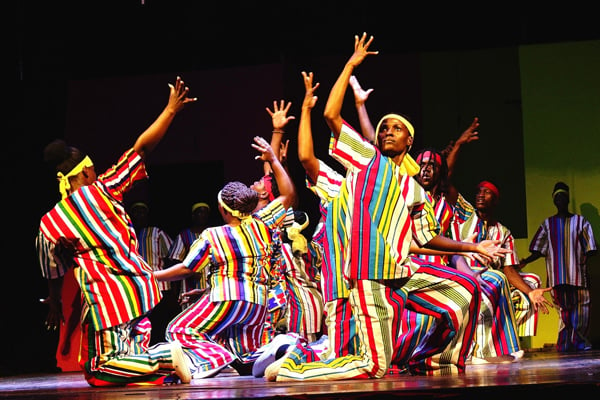Creatives urged to embrace Swahili language for regional careers

Part of the cast in one of the scenes in Kulumbisi and Kulunkalu by Alex Mukulu at the National Theatre in Kampala.
What you need to know:
- Kiswahili is now the most widely spoken language in Sub-Saharan Africa.
Ugandan creatives have been implored to utilise the four days a week opportunity to learn Swahili language in classes being conducted at the Uganda National Cultural Centre (UNCC) to boost their career opportunities beyond Uganda. There are two classes every evening of Wednesdays and Thursdays and rest of the classes are conducted on weekends.
Swahili language, also known by its local name as Kiswahili, once an Island dialect of the African Bantu tongue, has been spoken for centuries especially by the East African Coastal communities in Tanzania, Kenya and Zanzibar. Kiswahili is now the most widely spoken language in Sub-Saharan Africa.
Mr Emmanuel Lubega, the Kiswahili teacher, consultant and coordinator from Kiswahili teaching and enhancement program (KITENHAP), said they are partnering with National theatre to see that thespians, actors and artists, learn Kiswahili and start making compositions and productions in a language that can enable them breakthrough at the international arena.
Mr Lubega told Monitor that KITENHAP works from National theatre and is committed to promote creatives through Kiswahili language to scale up regional and international productions to reach wider audiences.
The Kiswahili class initiative comes at a time when Ugandan creatives, including actors, visual artists, and poets are facing challenges in accessing opportunities that require proficiency in the Kiswahili language. Ugandan productions are thus mainly consumed within the country.
On July 17, during the first Swahili class session, Mr Raymond Rushabiro, an actor, expressed his pain of losing out on a good project that would have earned him $1,500 per episode for a fifty two episodes.
"So Raymond if I calculated Ugandan Shillings, he lost Shs288m of an opportunity. That could have been a life changing opportunity for him," said Lubega.
"Alongside that we have given the public a free opportunity to come here and learn the language at no cost making it convenient for them," he added.
Mr Phillip Balimunsi, the curator of the Uganda National Cultural Center and the Uganda National gallery -Nommo gallery said having a master class in Kiswahili significantly contributes to regional integration that has been mooted over the years. Ugandans have been struggling with the exchange opportunites in Kenya and Tanzania.
"We have many visual artists who have taken up residences in circle agencies among others but really struggle and confine themselves to the English part of Nairobi," he said.
Mr Balimunsi add; "They never express themselves comfortably in conversations where you have Kenyans because Kenyans really tease them quite a lot. This is a great opportunity for the creatives, not only in performing arts but also, visual, poetry, dance and all that to exchange ideas freely in a language that is quite broadly spoken internationally."

Mr Robert Musiitwa, the head of Public Relations at Uganda National Cultural Centre (UNCC). Photo/Courtesy
Mr Robert Musiitwa, the head of Public Relations at the UNCC explained that the initiative to teach Kiswahili aims to empower Ugandan creatives to create cultural products that transcend Uganda’s borders.
"Notably, artists, especially musicians who perform in Swahili, find their music embraced across East Africa. The same goes for actors proficient in Swahili, as evidenced by recent audition calls requiring fluency in both English and Swahili," he explained.
Adding, "the UNCC, is committed to supporting the East African integration efforts. Offering free Swahili classes is one of our contributions. These classes are held physically at the National Theatre on Wednesdays and Thursdays from 6pm – 8pm, and on Saturdays from 11am– 1pm. Online classes will soon be available to include participants from upcountry, with details shared on our digital platforms."
The UNCC's goal is to host artistic productions and festivals curated in Swahili by participating students from different regions, climaxing at the National stage.




